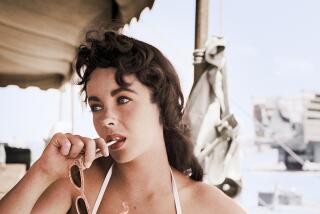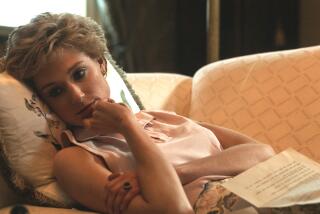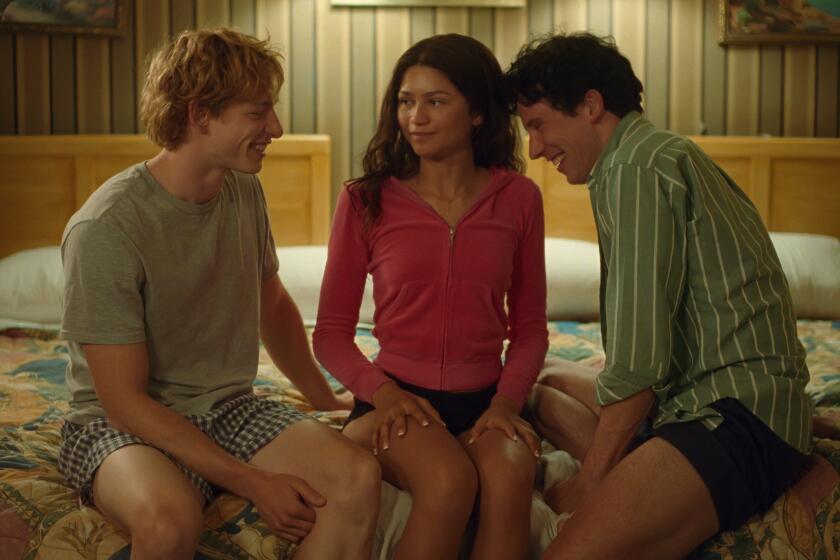The Sunday Conversation: Elizabeth McGovern
Elizabeth McGovern, 50, and her English director-producer husband, Simon Curtis, 51, recently hit the awards nominee circuit in tandem, he as the director of the film “My Week With Marilyn” and McGovern as Cora Crawley, the American-born Countess of Grantham, in “Downton Abbey.” McGovern’s recent noms cap a career largely spent out of the limelight after her high-profile start 30 years ago in “Ordinary People” and “Ragtime.” Season 2 of the PBS “Masterpiece Classic” hit concludes Feb. 19.
You’ve been living in London for about 20 years, raising your family and mainly working in British entertainment. “Downton’s” high profile here has turned into a comeback for you with American audiences. What has that been like for you?
It’s a gratifying way to see old friends I used to work with. It’s an excuse to catch up on old times. Obviously, I’ve visited my parents over the years, but I’ve had a couple of the most amazing trips having to do with the recent awards, where I’ve seen people from my professional past and it felt so good, I could hold my head up high. It was the kind of thing I had never dreamt for myself, ever. I had long ago decided that my life had taken this irrevocable path away from that world. And I don’t really miss it, but I miss a lot of the people in it. And it’s nice to see them again.
So you don’t miss Hollywood?
I still feel I’m doing the same work I’ve always done. It’s just a different country. I’m still playing parts and going to rehearsals and drinking coffee and discussing scripts with actors, so in that sense, the basic core of it hasn’t changed. It’s just that the sea of faces is different, and the weather’s not quite as good.
You and Hugh Bonneville played husband and wife in the BBC comedy series “Freezing” a few years ago. Is it a total coincidence that you’re married again?
The thing that tends to happen in England more than it does in America, probably because everyone lives in the same city, is that you tend to work with people again if you’ve had a good experience working with them. But the truth is we’ve played husband and wife not once, not twice, but three times. We’ve always had an easy time working together. And I do think that the people who were casting “Downton Abbey” had seen that sitcom, but whether that has to do with being cast in “Downton Abbey” as husband and wife, I don’t know.
Julian Fellowes describes your character, whose inheritance rescues a great English estate, as experiencing “slight alienation” as an American in England. I thought your character seemed reserved in a way that’s English, but I suppose she would have been there for more than 20 years.
I kind of made the decision that she knows how to work the system. She’s not a bull in a china shop anymore. She’s figured out her audience and knows how to play them to a certain extent.
You’ve said that you are “psychologically more English.” What did you mean by that?
I think it has to do with a sort of — and I don’t mean this in a negative way — I have a sort of inner cynicism that I think is more English than American. I don’t mean negativity, because I really love life. I think I recognize and feel very comfortable with this English attitude of evening out in their brains the highs and lows an American will go to about their expectations from life or their dreams of what they want from it. An Englishman won’t buy into that as much as an American will, and I feel lined up with that in my own brain, for whatever reasons, which I don’t understand because I am American.
So the English approach to show business and their work is more — and this is a big generalization, I hasten to say — but it’s more, they work on it as a craft job. There’s not the expectation that any minute they’re going to take over the world, the way show business is set up in L.A., for instance. I feel comfortable with that. England as a culture has endured so much more than America has as a culture, so it’s given them a different perspective.
Shirley MacLaine plays your mother in Season 3. Have you met?
I have met Shirley years ago in England. I haven’t worked with her, but I’m over the moon completely.
The matriarchs of Downton Abbey are a real power pair, between Shirley MacLaine and Maggie Smith.
Yeah, that’s the idea. Poor Cora.
What has it been like working with Maggie Smith, who plays Cora’s mother-in-law, the Dowager Countess of Grantham?
It’s hilarious. She is a taskmaster. Everybody has to be on their toes. She’s sharp as a whip and wonderful to work with.
As recently as 2008, you started fronting a band called Sadie and the Hotheads. That’s usually something people do in their 20s. Was that always something you wanted to do?
No, it was never anything I dreamed was even a remote possibility. I came to it much later in life when I found myself with two small children and a lot of time at home. And I started writing and playing songs, and then I thought I would look for somebody to improve my guitar technique. And I happened to find this guy who was also interested in writing and playing songs, the guitar teacher. Then we started writing together and performing with his brother, and then because the two of them were in that world, we brought in more musicians as time went on. Then it morphed into a desire to record, so we did one CD. Then we had more songs so we did another CD, and it slowly grew from there. I think that shedding my past and image of myself by leaving my profession and career in my former country gave me the complete freedom to throw myself into this thing without having the burden of my image of myself hanging over me.
I read that your grandfather William McGovern may have been the inspiration for Indiana Jones. (Coincidentally, Harrison Ford has reportedly expressed interest in making an appearance in the Edwardian drama.) Is that news to you?
Oh, yeah, definitely, although that rings a faint bell in my mind, but I wouldn’t say there’s any direct correlation. Where did that come from?
Wikipedia.
I can’t think why anyone in a million years would ever correlate the two, but he did have a period in his life where he was an explorer. He was reputedly the first white man ever to enter Lhasa. He entered by staining his skin a darker color and pretending not to be a white man. He wrote a book called “To Lhasa in Disguise.” He was a very fascinating man I didn’t know very well. He had children and became a professor at Northwestern in Evanston near Chicago, so he had by that time settled down in his life. It is an amazing story.
More to Read
The biggest entertainment stories
Get our big stories about Hollywood, film, television, music, arts, culture and more right in your inbox as soon as they publish.
You may occasionally receive promotional content from the Los Angeles Times.










